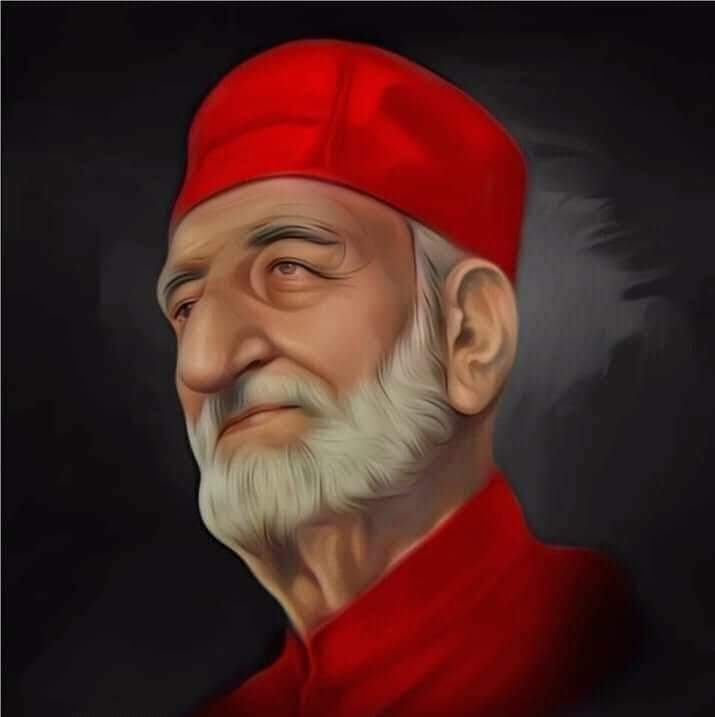M WAQAR..... "A man's ethical behavior should be based effectually on sympathy, education, and social ties; no religious basis is necessary.Man would indeed be in a poor way if he had to be restrained by fear of punishment and hope of reward after death." --Albert Einstein !!! NEWS,ARTICLES,EDITORIALS,MUSIC... Ze chi pe mayeen yum da agha pukhtunistan de.....(Liberal,Progressive,Secular World.)''Secularism is not against religion; it is the message of humanity.'' تل ده وی پثتونستآن
Thursday, January 19, 2023
د پاچاخان، فخر افغان ۳۵ تلین
له نن څخه ۳۵ کاله پخوا د ۱۹۸۸ د جنورۍ په شلمه د خدايي خدمتګارانو د تحریک نامتو مشر، فخر افغان خان عبدالغفار خان د ۹۷ کلونو په عمر وفات شو.
پاچاخان د شلمې پېړۍ د عدم تشدد هغه بنسټګر او سرلاری مبارز و چې د خپلې مبارزې په دغه لاره کې يې ډېرې سختۍ وزغملې، خو له خپلې غوره کړې لارې يو قدم هم شاته نه شو. هغه داسې يو سوله غوښتونکی شخصيت و چې نن یې د نړۍ په ګوټ ګوټ کې خلک احترام ساتي او يو زيات شمېر پوهان د هغه د مبارزو د قدردانۍ په خاطر څېړنې کوي
د ایشین ایج په نوم په نوې ډېلي کې د خپرېدونکې ورځپاڼې سرمحرر انندسهای چې د افغانانو په اړه یې څېړنې کړې، ليکي چې خان عبدالغفارخان يوه ځانګړتيا درلوده او هغه دا چې په مقاومت يې باور لاره خو د عدم تشدد په مقاومت. د هغه پیغام دا و چې د دولتي دفتر په مخکې کېني، چارواکو ته ووایي، دا هغه څه دي چې خلک یې غواړي او ستاسو پالیسۍ سمې نه دي، لطفاً خپلې پالیسۍ اصلاح کړئ. که تاسو خپلې پالیسۍ بدلې نه کړئ، دی د لوږې اعتصاب کوي، همدلته کیني او نه ښوري. سهای ليکي:”څو ځلې خان عبدالغفارخان د استعماري پولیسو له خوا ووهل شو، خو ده ويل، تاسو ما وهلای شئ، خو د عدم تشدد پر مقاومت او زموږ پر شعار چې سوله ده، زموږ عقیده له موږ څخه نشئ اخیستلای.”
زوکړه او وقات يې:
عبدالغفار خان د بهرام خان زوی د فېبرورۍ په شپږمه، ۱۸۹۰ز کال کې، د اتمانزيو په ټبر، يوه سوله غوښتونکې پښتانه کورنۍ کې، په اوسني خبير پښتونخوا ايالت کې وزږېد او د جنورۍ په شلمه ۱۹۸۸ مېلادي کال کې ومړ.
پاچا خان څوګ دی؟
د عبدالغفار خان پلار بهرام خان په خپله سيمه کې د ځمکو څښتن خان او ملک وو. په هغه وخت کې د عبدالغفار خان لپاره د پلار او کورنۍ په شتو او مزو کې د راحت ژوند او هوساينې هر څه شته وو. خو عبدالغفار خان نرم بستر، سوړ او راحت خوب ونه کړ، د قوم او انسانيت په پار يې يو بله له ستونزو او کړونو ډکه لاره غوره او وټاکله.
د پاچا خان مبارزه:
عبدالغفار خان؛ د بريتانيوي راج او باج پر وړاندې د نه تاوترېخوالي مبارز او مشر، په جهالت او ناپوهۍ کې د پروت پښتون ولس لپاره د رڼا او زده کړو ښوونکی، د ظلم پر وړاندې غږ، خدايي خدمتګار، د محافظه کارۍ د کلتور پر وړاندې خنډ، د مذهب د ټېکه دارانو سر درد، د خپلواکۍ او يووالي نه ستړی کېدونکی سر لار او څاروان؛ پاچان خان شو.
پاچا خان کلي تر کلي، کور تر کور او تر دې چې، د ټولنې فرد ته يې ځان ورسولو؛ د نه تاوترېخوالی، د خپلواکۍ په پار مبازره، سوله – مينه، حوصله او وېښتيا يې ورته توصيه او لارښوونه وکړه.
وايي چې پا چاخان خپلو خلکو ته وويل، چې که چېرې له پوځ، پوليسو او زورواکو ويره لری، نو داسې وسله به درکړم، چې دوی به يې پر وړاندې مقاومت ونشي کړی؛ دا پيغمبري وسله ده، دا وسله د خدای له خدمتګارانو سره ده، دا وسله زغم، حوصله او عدالت دی.
پاچا خان اوږدې لارې په پښو وهلې، په ۱۹۱۵ کالنو کې يې د پښتونخوا ۵۰۰ کلي ولېدل چې بېده او ناخبره پرته دي، هر کلي ته لاړ ته د وېښتيا او مبارزې يې ورته وويل چې، پښتون وېښ شي، ځان او نړۍ جوړه کړي.
پاچا خان ناکامه سړی نه وو، پاچا خان په کم وخت کې پر ځان سل زره کسان راټول کړل، يون او خوځښت شو، د پاچا خان مبارزې مېوه ورکړه او رنګ يې راوړ. خو پاچاخان د خپلې مبارزې ميوه په لومړۍ ورځ، اونۍ، مياشت او کال کې نه ده تر لاسه کړې، پاچا خان وځورېدو، بندي شو، شنکجه شو، وګواښل شو او ستړی شو، خو ده ستړيا احساس نه کړه.
په ۱۹۳۰ کالنو کې، د بريانيوي راج پر وړاندې به مبارزه کې يې د پېښاور په قصه خوانۍ کې يې، کابو ۲۵۰ ملګري د بريتانيا د پوځ د مرميو ښکار شول، پاچا خان بندي شو، خو په عمل کې يې صبر، زغم، حوصله او نه تاوترېخوالی عملي کړ.
پاچا خان اوسني هند ته ورسېد، مهاتما ګاندي سره يې د يو فکر اړيکه ټېنګه شوه، هند ته يې د نه تاوترېخوالی غږ ورسوه. پاچا خان تر هغه له ګاندې سره وو چې په ۱۹۴۷ کې محمد علي جناح پاکستان را بېل کړ. د پاکستان او هند يو وجود او تجزيې، د پاچاخان مبارزه سړه نه کړه. د پاچا خان منزل، د نه تاوترېخوالي پر وسلې مبارزه او وېښتيا وه.
د پاچا خان ستړي ژوند او مبارزې؛ انسان، افغان او پښتون ته ډېر څه ور زده کړل، ډېر څه يې په لاس ورکړل او د ژوند ريښتنې مانا يې ورته وښودله.
د پاچا خان مبارزه که له ګاندې ډېره نه ده، نو کمه خو هېڅکله هم نه ده، خو ګاندي له مرګ وروسته بيا را ژوندی نه شو، چې خلکو ته ووايي، زما مبارزې وستايئ؛ او له ګاندي څخه ګاندېزم جوړ کړئ، بلکې وېښ ملت تر ې پاتې شو او ګاندي يې ګاندېزم کړ.
https://taand.net/?p=219510
#Pakistan - #PPP not to be part of any electoral coalition
Opinion: Pakistani foreign minister: ‘Democracy is the only way to take on terrorism’
By Lally Weymouth
https://www.washingtonpost.com/opinions/2023/01/19/bhutto-zardari-pakistan-interview/
